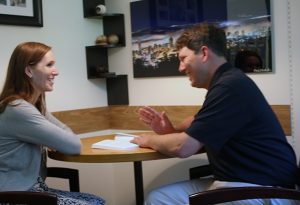Is your student maximizing their relationship with their Program Counselor, who can support them in planning for academic success? We asked Annie Popoff, Program Counselor for the School of Education, about academic advising, improving grades, and registering for classes.
 What is your role as a Program Counselor?
What is your role as a Program Counselor?
As the Program Counselor for the School of Education, I provide academic planning and advising to all undergraduate Education majors, as well as to graduate students in the Master of Arts in Teaching (MAT) Program. Program Counselors for each School (Business, Engineering, and Nursing) and the College of Arts and Sciences provide specific academic planning services for students enrolled in programs within that School or College. Students should visit a Program Counselor for 4-year planning, choosing courses for registration, planning for Study Abroad, discussing summer or transfer coursework, adding majors or minors, or exploring general career options related to specific programs. Program Counselors also assist with UP Orientation and Visitation, so they’re a great resource to answer first-year and transfer student questions!
What is your favorite part about being a Program Counselor?
I love welcoming new students into the campus community. Going to college can be exciting, scary, and overwhelming all at the same time. I like being able to provide a safe, supportive environment to students who may be having a hard time with the college transition. I also enjoy getting to know each student personally. The School of Education is one of the smaller Colleges on campus, and it gives me the unique opportunity to get to know my Education majors on a deeper level.

How can students make the most of their relationship with their Program Counselor?
Visit us often (once per semester is great) and come prepared with questions. Remember that Program Counselors are experts in academic planning, but we also know a lot about the University as a whole. If you’re looking for an on-campus job, wondering how that academic minor might help with your career pursuits, or want to talk about resources on campus, we’re a great place to start. Especially when you’re not sure who to talk to, reach out to your Program Counselor. We’re happy to help!
Click here to find out how your student can contact their Program Counselor.
If a student’s mid-term grades aren’t where they want them to be, what advice would you give someone who wants to finish off the semester strong?
Here are a few things for students to keep in mind:
- Connect with resources on campus to get the support you need to succeed. Are you having trouble grasping the concepts in your math class? Visit the Math Resource Center in the Learning Commons. Is test anxiety causing you stress? Contact Brother Thomas Giumenta, Learning Assistance Counselor. Accessible Education Services (AES) offers testing and study accommodations to students who are eligible. Professors can review course concepts with you during office hours if you have additional questions after a lecture. Find a group of students to study with in your classes. There are lot of ways to work towards pulling your grade up!

- Calculate your grade in the course. Using the course syllabus, make a list of the assignments that you’ve completed so far and the grades received. Next, look at the assignments left in the class and the points possible for each one. Note if participation points, or other points, can still be obtained for the class. Calculate the grades you would need to receive on the remaining assignments to get the overall grade you want. A professor or Program Counselor can help you do this calculation if you would like assistance.
- Know your options moving forward. Once you’ve calculated your possible grade moving forward, you can make a choice on how to best proceed. Most of the time, this means putting together a plan for success (attending class, taking good notes, studying for a certain number of hours per week, etc.). However, if you know that the highest possible grade you can get for the course is a D, then you may consider withdrawing from the class and retaking it at another time. If the class is not required for the University Core or your major, you may consider changing the grade for that course to “Pass/No Pass.” You may also decide that a D is an acceptable grade for this course and that you will work toward obtaining that grade. Consider all of your options and choose the one that’s best for you.

Do you have any tips to share with students for alleviating concerns or stress regarding class registration?
It’s very normal for students to not get into all of the courses they want each semester. I experienced this myself as an undergraduate student, and I know that most freshman feel anxious during their first registration experience. However, keep in mind that you won’t be off track to graduate in four years! Make a ‘Plan A’ for registration (the courses you really want to register for), and then make a list of alternative courses that could be used for backup. If it comes time to register and you find that one of your preferred courses is closed or full, try registering for a course on your backup list. If you cannot get into a course that you believe is required for your major and must be taken during a specific semester, please reach out to your Program Counselor for assistance. There will always be a way to get you into the courses that are required to keep you on track.
What are the most important dates and deadlines for students to know for advising and spring class registration?
In general, students will want to make an appointment with their advisor between mid-October and early November to prepare for registration.
Students who are Athletes, Honors, or have AES priority registration will be contacted by the associated office with important registration deadlines. Registration forms will be due to these offices earlier than the regular registration period.
Students can register themselves for classes online through Self Serve at the time designated on the Registrar’s website. Student registration times are randomly selected each year by the Registrar’s office. The link to the registration schedule for Spring 2019 is available here. Registration takes place November 5-14, 2018.
Students can continue to register after their initial registration period. Registration stays open through the first week of the following semester (January 18, 2019).
—
Annie Popoff, M.A., is an academic advisor in the School of Education at UP. Annie completed her bachelor’s degree in Psychology and master’s degree in Higher Education and Student Affairs. As a current doctoral student, her research interests include college student development and learning theory. Her vision is to see all students reach their fullest potential by engaging in campus programming, developing meaningful professional and personal relationships, and leaving college with the skills and passion to pursue lifelong dreams. When she’s not working, Annie enjoys cooking, hiking, and playing with her corgi Ellie.
